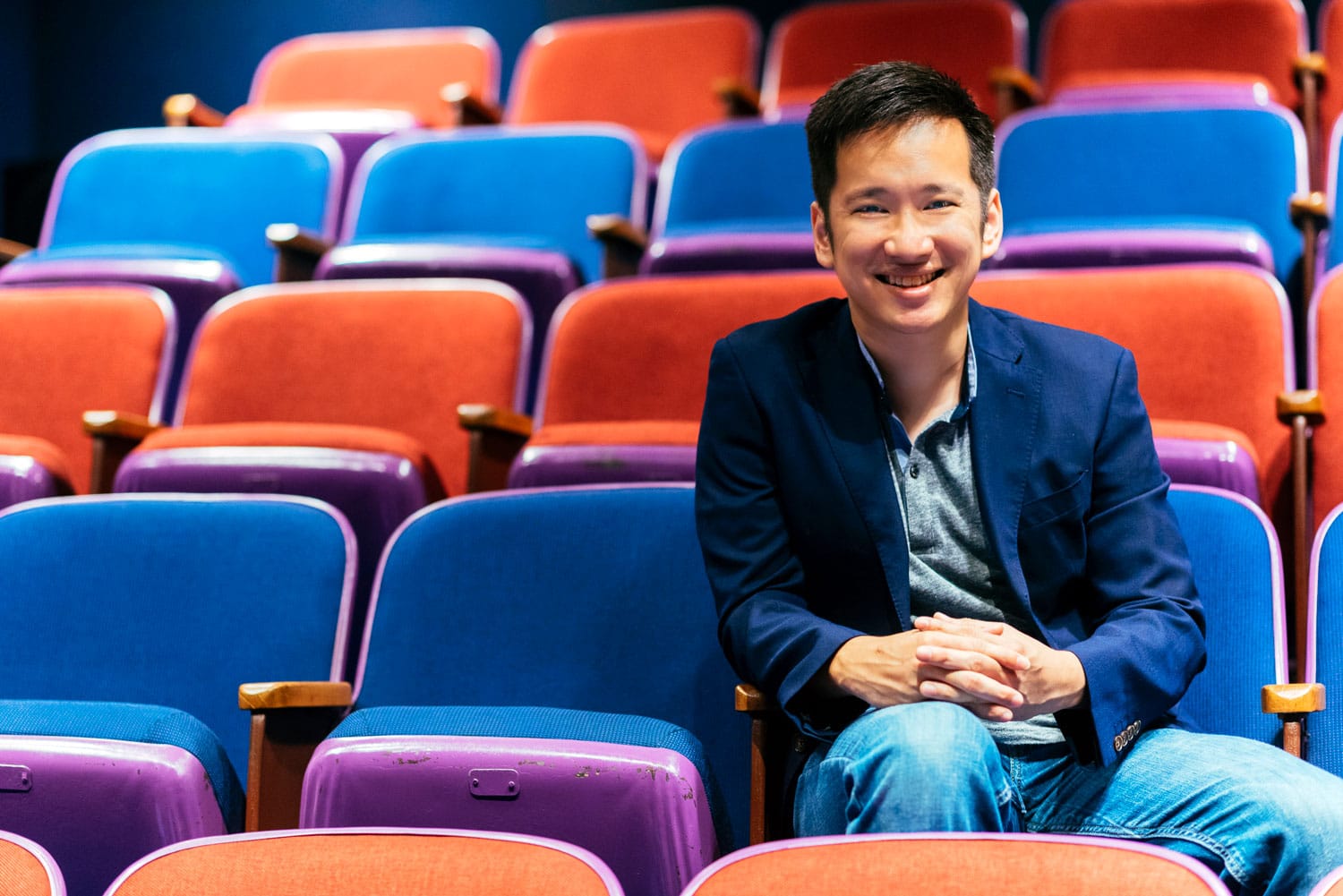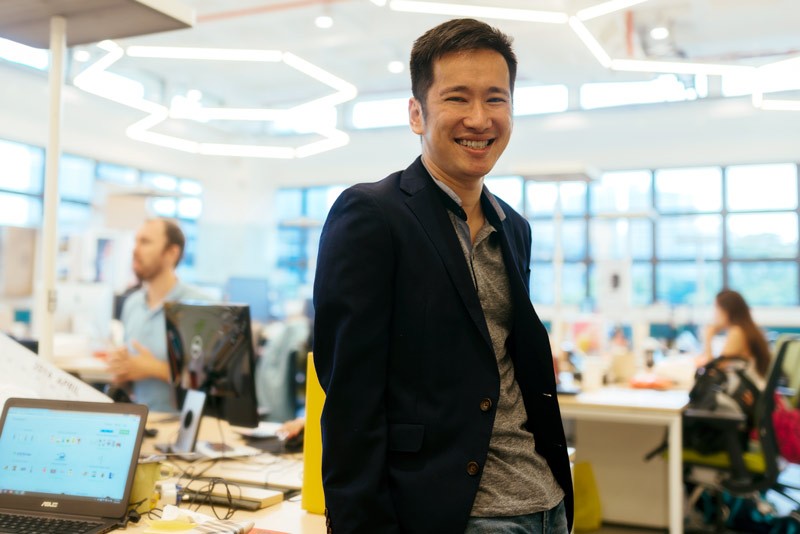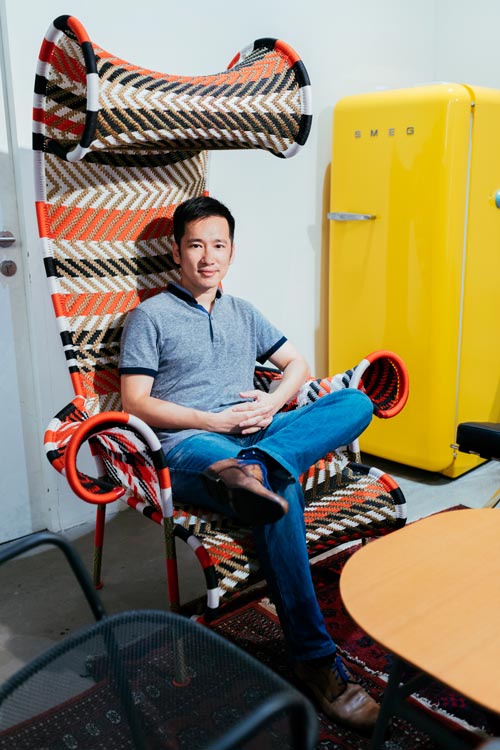Isaac Tay: Creating Happy Homes Through Flexible Jobs

Outside, a ‘taunting’ neon signage reads—“To Bee or not to Bee”. Inside, you are greeted by an atrium of Bearbrick figurines. And beyond this column of gatekeepers is where the home-grown within-the-hour grocery delivery start-up has built a home, or hive for that matter. “Our guys [and girls] spend a lot of time here, so it is very important to us that they have a nice place to work in,” Isaac Tay says, refusing to disclose the cost of the renovations. They had outgrown their old office as headcount jumped from just eight a year ago, to a hundred now across three markets—Singapore, Hong Kong and Taipei. Over the next few months, it’s looking to expand into four more. A result of a pivot from LifeOpp, an application which helps businesses hire service staff, honestbee recruits and trains “Bees” who are professional grocery shoppers. “In the early days, all of us were doing the shopping ourselves,” Isaac adds. Even now, anyone who joins the company experiences what it is like to be a shopper, regardless of the whether he or she is an engineer or marketer. Refreshers are also required for existing staff. Although the idea has changed, the founders have remained true to their original mission, which is to “create happy homes through flexible jobs”. There are now more than 1,200 shoppers— students, housewives, even retirees, who make a side income on honestbee. “We make it easy for people to work part-time, near where they live.” We go up to the “indoor roof” using a hidden ladder where we find an engineer camped out in a corner. As expected, he does not acknowledge our presence. He is keeping crucial systems running for grocery-starved families across Singapore and beyond. “Our model of having no inventory forces us to focus on software and think of this as a software problem,” he adds. “If you hire great engineers and UI/UX people, you can solve many problems a lot faster, and in a more cost-efficient manner.” Isaac , himself an engineer, was part of the original team at SGEntrepreneurs, and later acquired by Tech in Asia. The following one and a half years saw him become a stand-up comedian, performing almost every evening. The experience conditioned him to not be afraid of failing. “When you tell a joke on stage and no one laughs—that’s probably one of the harshest kinds of failures!” To get down from the ‘roof’, there is the additional option of a slide.
YONG HUI YOW: How much was SGE acquired for?
ISAAC TAY: [Laughs and shakes head] I can’t say man.
YONG HUI: How did you get involved with honestbee?
ISAAC: The founders have always wanted to make a difference in people's lives. We started off with LifeOpp, which pivoted to honestbee. Our mission is to create happy homes through flexible jobs, and we do this by providing part-time workers with economic opportunities. It has always been our desire to contribute to society using technology. Although the idea has changed, the mission has not. After SGE was sold to Tech in Asia, I was looking out for something new to do. This while I was doing stand-up comedy and other start-ups. A very good friend of mine introduced me to Joel [Sng], who is our CEO.
YONG HUI: Why was the grocery vertical chosen?
ISAAC: We explored a few verticals, but we chose grocery because it's something people have to do regularly, so there is repetition, and it’s something everyone needs. From the point of view of market size, even though the amount transacted online now is still relatively small, it is growing and will continue to grow. We saw the opportunity to build a strong brand and as people trust us more, they will come back to us. Our model also does not dis-intermediate any party, and that’s attractive to us as we see our partners as a key pillar of our business.
YONG HUI: How did you decide to go the no-inventory way?
ISAAC: This model allows us to scale quickly, and it was an intentional decision. Within a year of our official launch [July 2015] , we went into Hong Kong and Taipei. This model forces us to focus on software and think of this as a software problem.
We want to work with the NTUCs of the world. We are not here to take away their business. Instead, we are a channel for them to grow.
YONG HUI: How many shopper Bees do you have?
ISAAC: We have about 1,200 Bees and growing. They are students, housewives and even retirees. The majority of them are part-timers, but we have a few key Bees who are full-timers. We call them supervisors who are stationed at each partner location. We make it easy for people to work part-time, near where they live.
YONG HUI: Have you done grocery runs yourself?
ISAAC: Yes, of course! In the early days, all of us were doing the shopping ourselves. Everyone who joins HonestBee has to do shopping to know how it is like. For existing staff, they also have to go through a refresher regardless of whether you are an engineer or marketer.
YONG HUI: How are shopper Bees compensated?
ISAAC: Our Bees are paid by the hour, but there is a performance portion as well, based on the number of orders, and items in an order.
YONG HUI: Is it also based on the ratings and feedback they receive from the user?
ISAAC: Not exactly. We use a pay scale instead. Bees first graduate as Shoppers, who progress to become Senior Shoppers. After that, if they do well, they become Super Shoppers.
YONG HUI: How do you deal with missing items or unavailable items?
ISAAC: Since we don’t hold inventory, sometimes, an item may be out of stock. What we do is suggest a replacement in case an item is out of stock. We think of ourselves as a concierge service. Our shoppers pick and buy groceries for you the same way they shop for their own families. This is fundamental to our business model and customer experience.
YONG HUI: How is the training process like for a “WannaBee”?
ISAAC: When a new shopper joins us, they’re given an online test to make sure they have an idea of how to select groceries. Once they have passed that, they come in for a lecture, and we teach them how to use our app and engage customers. Then they start off as trainee shoppers. Most of it is learning on the job when the senior shoppers are able to assist. The training process is stringent to ensure we deliver the service we want for our users.
YONG HUI: Will you go beyond groceries soon?
ISAAC: Yes, we plan to do that, but it's still too early to discuss those plans.
YONG HUI: Why do you think some of your competitors have decided on having inventory, when you have a more advantageous cost structure?
ISAAC: I'm not a mind reader so I don’t know other companies might do it differently, but I know why we chose our model. Everything is moving towards software, and that makes things a lot more scalable. If you hire great engineers and UI/UX people, you can solve many problems a lot faster, and in a more cost-efficient manner. Another important aspect of our model is that there is no dis-intermediation. We want to work with the NTUCs of the world. We are not here to take away their business. Instead, we are a channel for them to grow. These businesses are very important to our society and provide jobs to many people. There are three core pillars in our business—customers, Bees, and partners. Our fourth pillar is of course our employees.
YONG HUI: Do supermarkets reduce prices on HonestBee?
ISAAC: We do same-store pricing, and if NTUC has a promotion, we pass the cost savings on to our customers.
YONG HUI: People can expect to get their groceries within the hour?
ISAAC: With big chain partners such as NTUC, most of our customers will receive their groceries within the hour, depending on where you live. For our boutique partners, it's within the same day.
YONG HUI: How long in advance can a family order their groceries from HonestBee?
ISAAC: Our customers can order at least seven days in advance, and because we don’t hold inventory, everything is just-in-time. This seven day period allows us to implement certain optimisations, which is essentially a software problem.
YONG HUI: What challenges do you anticipate as the business scales?
ISAAC: As we grow, building our pool of Bees and making sure all of them provide the same level of customer experience we want for our users is a challenge. For a Singapore start-up to do well and grow, we need to think outside of Singapore quickly. For that to happen, we ask ourselves if we have the level of engineering and design talent to do that. One of the hopes for us is to make HonestBee a start-up which attracts the best talent back to Singapore from all over the world. If they want to return to Singapore to spend more time with their families, we want to be the place where they won’t need to compromise on the challenges they can tackle, and the impact they can make.
YONG HUI: How does the lack of homogeneity across this region affect your strategy?
ISAAC: If you are a US company, there are probably 20 Tier 1 cities that are culturally and demographically similar. In South East Asia, even between Singapore and Kuala Lumpur, culturally and demographically we are so different. The challenge is to build enough expertise within a Singapore-based organisation that can expand quickly into other cities while maintaining the same culture and quality. That is a challenge we have faced and will continue to face. One way to mitigate that is to hire great people who have cross-cultural experience or are dual-cultural.
YONG HUI: How is Singapore different from Taiwan?
ISAAC: We hired a local team in Taipei, but we have also hired Taiwanese who have moved to Singapore as engineers. Our experience is that they are driven and smart. From a technical ability standpoint, it’s there, so even though we have different primary languages, it’s not an issue. In Taipei, we have also recruited great guys with a breath of experience in start-ups. I don’t think there are many differences except perhaps a different primary language. We have been very lucky in the other markets too. We have always managed to recruit very good people. A big part for us is a culture interview, which works both ways. Are we the right place for you? And are you the right person to work here?
When we started, we had hoped to make a big impact, but to actually see it happening every single day is something I have never experienced before.
YONG HUI: How is HonestBee different from your SGE experience?
ISAAC: For one, we have grown really fast. In January last year, we had eight people, now we have a hundred. I have had to learn a lot and recognise what I do not know. The three co-founders are quite young, but we have been very fortunate to recruit many senior people with much more experience than us in their specialised areas. They have placed their faith in our leadership, and we have learned a lot from them. As leaders, we need to be able to see the gaps in the business as we grow to become a 200, 300, or 400-person pan-Asian company. When we started, we had hoped to make a big impact, but to actually see it happening every single day is something I have never experienced before.
YONG HUI: What is the age of the youngest Bee?
ISAAC: Eighteen. We have not gone younger than that, and one of the reasons is you need to be above eighteen to purchase alcohol, and some orders do have alcohol in them.
YONG HUI: The local online grocery market is around S$120 million, according to some sources. How much of that is going to HonestBee?
ISAAC: I cannot really disclose that, but we have done very well for our partners.
YONG HUI: You’re a stand-up comedian too.
ISAAC: Yes, I started doing stand-up in 2013, and I did it seriously for one and a half years. Almost every night I would be on stage. By the way, the Asian Comedy Fringe Festival is in April, and some of the guys who I have performed with will be there. Sadly, I won’t be able to perform. If you like stand-up, you should check that out.
YONG HUI: Where did you perform?
ISAAC: I performed at places like Comedy Masala and Talk Cock Comedy at Blu Jaz Cafe.
Stand-up comedy conditioned me to not be afraid of failing. When you tell a joke on stage and no one laughs—that’s probably one of the harshest kinds of failures!
YONG HUI: What did you learn from doing stand-up comedy?
ISAAC: Stand-up and improvisation comedy have helped me personally. As you know, the Lean Start-up Methodology is build, measure, and learn. In stand-up comedy, it’s a bit like that— you write, perform and analyse what made people laugh and what didn’t. Why did the same joke work every night but not tonight? Is it the crowd? Or did the previous comedian before me make a similar joke? Is it my dressing? Posture? Doing it for one and a half years forced that habit into me. When you build a habit into your life, it will be translated to other parts of your life too. In Karate Kid, Mr Miyagi was supposed to teach Daniel karate, but he made him wash a car every day. So Daniel asked Mr. Miyagi why he wasn’t teaching him karate. Mr. Miyagi said he was. He then tried to punch Daniel, who reflexively blocked the attack with a wave of his arm from all the car-washing. The muscle memory helped him build instincts. Similarly, stand-up comedy conditioned me to not be afraid of failing. When you tell a joke on stage and no one laughs—that’s probably one of the harshest kinds of failures!
YONG HUI: Was this why you started stand-up?
ISAAC: Well, that's the positive side effect. I did not realise that when I started out. I got into stand-up comedy simply because I enjoyed watching it, but I didn’t just want to be a consumer—I wanted to be a producer. I wanted to be part of the community. When you go on stage, you are creating something, and if you do it well, you are creating a great night for people.
YONG HUI: From your experience, is there an optimal time when people would laugh more? Or is it simply due to the amount of alcohol they have consumed as the night goes on?
ISAAC: Alcohol does help people laugh more easily, but what really helps is charging for the tickets. Partly, this is due to self-selection because people who pay for comedy know exactly what they are getting themselves into. They are also more likely to know and understand the comedic experience, and so are pre-disposed to enjoy themselves. The nights that tend to struggle are the free nights, which can attract the wrong audience.
YONG HUI: Do you think they are more inclined to laugh because they have paid?
ISAAC: Alright! I see what you’re saying. There might be a little bit of that, but what is more likely is they understand the different techniques of what the comedian is trying to do. They can see the pattern of the story and appreciate it. For folks who pay, there is that common ground with the performer, so it makes it easier at times. Having said that, there are some comedians who can make anyone laugh.
YONG HUI: Do you study other comedians?
ISAAC: Yes, I spend a lot of time studying other comedians in different genres.
YONG HUI: When you are writing, do you find it hard to come up with something original especially after studying other comedians?
ISAAC: Ah! Yes, as I write more, I have to distance myself from comedians who I find have a similar style and background to me. This is because I don’t want their ideas to seep into mine. Sometimes it does, which is fine, but I try to avoid that. You want to make it as original and authentic as possible. Sometimes, you may think it’s an original thought, but it was actually a seed planted in your mind from a show you watched three months ago.
YONG HUI: Is this the same way you think of start-up ideas?
ISAAC: With start-up ideas, the danger is you may think you have a similar problem as another start-up, but you really only see the surface of what the other start-up is doing. If you’re just replicating ideas, are you sure the context of the problem is the same? Are you just trying to copy what is on the surface? If so, you have probably already doomed it from the outset. There are a lot of things you need to understand beneath what’s merely superficial.
YONG HUI: What do you think of Kumar as a comedian?
ISAAC: Kumar is an iconic comedian. There is no pretension in his shows. Without him and other pioneers in theatre and the performing arts, I wonder if we would have progressed to where we are today. Tastes and cultures may have shifted, but that does not diminish what they have contributed.
YONG HUI: Why aren’t your shows on YouTube?
ISAAC: Because I'm doing it for myself. I want to tell my jokes in person, as a performance, but I did not intend for it to be public in that way.




